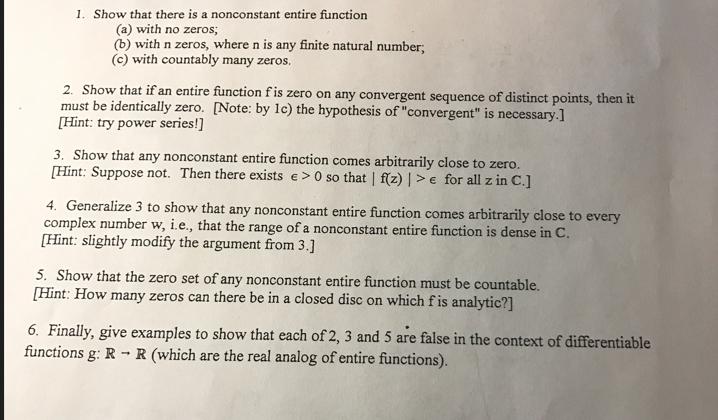Answered step by step
Verified Expert Solution
Question
1 Approved Answer
1. Show that there is a nonconstant entire function (a) with no zeros; (b) with n zeros, where n is any finite natural number;

1. Show that there is a nonconstant entire function (a) with no zeros; (b) with n zeros, where n is any finite natural number; (c) with countably many zeros. 2. Show that if an entire function f is zero on any convergent sequence of distinct points, then it must be identically zero. [Note: by 1c) the hypothesis of "convergent" is necessary.] [Hint: try power series!] 3. Show that any nonconstant entire function comes arbitrarily close to zero. [Hint: Suppose not. Then there exists e> 0 so that | f(z) |>e for all z in C.] 4. Generalize 3 to show that any nonconstant entire function comes arbitrarily close to every complex number w, i.e., that the range of a nonconstant entire function is dense in C. [Hint: slightly modify the argument from 3.] 5. Show that the zero set of any nonconstant entire function must be countable. [Hint: How many zeros can there be in a closed disc on which f is analytic?] 6. Finally, give examples to show that each of 2, 3 and 5 are false in the context of differentiable functions g: R R (which are the real analog of entire functions). -
Step by Step Solution
★★★★★
3.57 Rating (178 Votes )
There are 3 Steps involved in it
Step: 1
Solution 1 a A nonconstant entire function with no zeros is ez b A nonconstant entire function with n zeros is za1za2zan c A nonconstant entire functi...
Get Instant Access to Expert-Tailored Solutions
See step-by-step solutions with expert insights and AI powered tools for academic success
Step: 2

Step: 3

Ace Your Homework with AI
Get the answers you need in no time with our AI-driven, step-by-step assistance
Get Started


